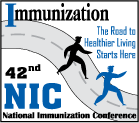
|
|
CDC NIP/NIC Home Page
|
Thursday, March 20, 2008
104
Vaccination Administration Errors Reported to the Vaccine Adverse Event Reporting System (VAERS)
Elaine R. Miller, Beth F. Hibbs, and Barbara A. Slade. Immunization Safety Office, Office of the Chief Science Officer, Centers for Disease Control and Prevention, 1600 Clifton Road, NE, MS D-26, Atlanta, GA, USA
Learning Objectives for this Presentation:
By the end of this presentation, participants will be able to state what the most commonly reported vaccine administration errors are and which vaccines are most involved in reported errors, based on data from the Vaccine Adverse Event Reporting System (VAERS).
Background:
VAERS is a federally mandated, passive reporting system for adverse events that occur after US licensed vaccines. With the addition of several new vaccines since 2005, the US recommended immunization schedule continues to increase in complexity.
A previous analysis on reports of errors utilizing VAERS data received from 1994 to 2001 found 49 reports of medication error.
Objectives:
The goal of this review is to characterize recently reported vaccine administration errors in VAERS and to determine if newly recommended vaccines are associated with these errors.
Methods:
We searched VAERS reports received from 1/1/2006 to 9/30/2007 for coding terms that indicated administration errors. We analyzed the output to determine what types of errors occurred and which vaccines were most commonly reported.
Results:
VAERS received over 1800 reports which contained at least one code indicating medication errors. This was 5.3% of all reports during this time period. Reports with error codes most frequently involved the following vaccines: 1) rotavirus (16%) 2) pneumococcal conjugate (11%) 3) human papillomavirus (11%) 4) varicella (11%).
The most commonly reported errors included: 1) general medication error, type not specified (38%) 2) wrong schedule (31%) 3) wrong drug given (24%) 4) incorrect dose (6%) and 5) incorrect route (5%). Only 4% of these reports indicated a serious adverse event as an outcome.
Conclusions:
Vaccine administration errors are commonly reported in VAERS, are commonly associated with some of the newly licensed vaccines, and may be increasing. Although patients are rarely harmed, efforts to decrease errors need to be a focus for those administering vaccines.